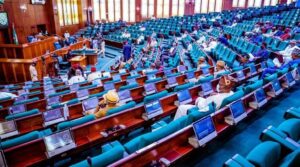The Central Bank of Nigeria has frowned at the action of the Nigeria Customs Service which appears to be more focused in raking huge revenues than stabilizing the Nigerian economy.
Recall that Importers have accused the Customs of changing the exchange rate arbitrarily without regards to the rate calculated at the time of issuing Form M, which is the document importers fill to indicate their intention in importation of physical items.
The apex bank in a memo dated February 23, 2024 with a reference number: TED/FEM/PUB/FPC/001/007 and signed by its Director, Trade and Exchange Department, Dr. Hassan Mahmud, directed the Customs to stick to whatever exchange rate at the time of issuing Form M.
The CBN stated that following the liberalization of the Foreign Exchange (FX) market on the Willing Buyer-Willing Seller trading principle, it has noted the concerns of importers of goods and services in the irregular changes in the Import Duty Assessment levies applied by the Nigeria Custom Service.
The apex bank stated that “These developments have further built uncertainties around the pricing structure of goods and services in the economy and created abnormal increases in the final sale prices of items, which is largely driven by uncertainties, rather than traditional market fundamentals, with implications to near term inflation trends.
“To this effect, the Central Bank of Nigeria wishes to advise that the Nigeria Custom Service and other related Parties adopt the closing FX rate on the date of opening Form M for the importation of goods, as the FX rate to be used for Import Duty Assessment.
“This rate remains valid until the date of termination of the importation and clearance of goods by importers.
“This would enable the Nigeria Custom Service and the importers to effectively plan appropriately and reduce the uncertainties around varying daily exchange rate in determining their revenue or cost structure, respectively.
“Therefore, effective 26th February 2024, the closing rate on the date of opening of Form M for the importation of goods and services would be the rates that would apply for the assessment of import duty.
“This supersedes the requirements of Memorandum 9, J (2) of the Central Bank of Nigeria Foreign Exchange Manual. (Revised Edition), 2018.
“While the CBN is mindful of the initial volatility and price distortions in the aftermath of the FX market liberalization, the Bank is confident that these reforms, would in the medium term, ensure stability in the market and entrench market confidence necessary to attract investment capital for the growth and development of the Nigerian economy.”










More Stories
Trump’s mass deportation catches up with six Nigerians who were bundled to Lagos via Delta Airline
Zamfara lawmaker laments worsening insecurity, says bandits now feed newborns to dogs
University Don urges JAMB Registrar to resign over UTME mess, says weeping isn’t enough